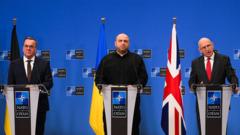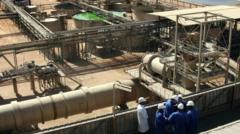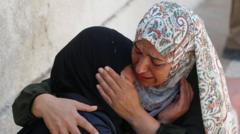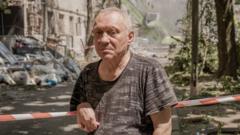European nations pledged €21 billion in military support for Ukraine, highlighting their commitment amid ongoing conflict. The aid focuses on air defense and drone capabilities, reflecting shifting priorities in international support.
European Allies Commit €21bn to Support Ukraine Amid Ongoing Conflict

European Allies Commit €21bn to Support Ukraine Amid Ongoing Conflict
In a crucial meeting, NATO allies announced a significant military aid package for Ukraine as the war escalates, with no end in sight.
Ukraine's European allies have unveiled a substantial new military assistance package amounting to €21 billion (£18.2 billion), underscoring their dedication to supporting Kyiv during this pivotal year of the ongoing war. Convened at NATO's headquarters in Brussels, members of the Ukraine Defence Contact Group put forth plans to provide air defense systems, missiles, and other essential military resources, aiming to compensate for the changing priorities of the United States under Donald Trump.
German Defence Secretary Boris Pistorius announced that Berlin would contribute €11 billion over the next four years, while his British counterpart, John Healey, emphasized the importance of these pledges in sending a strong deterrent message to Moscow. Despite promises of a ceasefire from Trump, Europe’s defense ministers reported no signs of an end to hostilities.
The latest support package, which includes a £450 million investment from the UK and Norway for radar systems, anti-tank weapons, vehicle refurbishments, and extensive drone supplies, is part of a broader commitment made earlier this year. In January, the UK pledged £4.5 billion in military aid, representing its largest contribution to Ukraine.
Air defense emerged as a key focus at the Brussels meeting, with Healey noting the significant impact of drones on the battlefield. Russian forces reportedly launched 10,000 glide bombs against Ukraine in the first three months of this year, alongside a staggering daily average of 100 drones. Healey estimated that drone warfare now accounts for 70% to 80% of battlefield casualties, overshadowing traditional artillery.
The 27th gathering of the UDCG saw defense ministers from 50 nations converge, with U.S. Defence Secretary Pete Hegseth participating virtually. He expressed gratitude towards European allies for their ongoing efforts, though Pistorius clarified that Hegseth’s remote attendance was simply a scheduling matter.
During the meeting, Ukrainian Defence Minister Rustem Umerov expressed appreciation for Europe orienting its security assistance strategies towards Ukraine, while stressing the enduring significance of American support as indicated by Hegseth’s involvement. All leaders present criticized Russia for its lack of progress towards a ceasefire, a sentiment echoed by UK officials who highlighted over a month of Russian resistance to a U.S.-backed peace initiative.
As diplomatic attempts continue, U.S. envoy Steve Witkoff embarked on another mission to Russia, although Kremlin spokesperson Dmitry Peskov tempered expectations for meaningful breakthroughs. Meanwhile, Russian military forces announced their capture of the village of Zhuravka within Ukraine's Sumy region, awaiting confirmation from Ukrainian officials. Earlier, President Zelensky reported a significant buildup of Russian soldiers at the border, suggesting preparations for further offensive operations against Sumy.






















